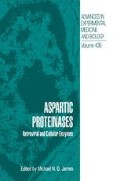Abstract
The pregnancy-associated glycoproteins (PAG) are a large and diverse group of proteins produced by the placenta of cattle, sheep, pigs, and presumably most other species within the Artiodactyla order.1,2 PAG are members of the aspartic proteinase gene family having greatest sequence identity (~50%) with pepsinogens.1 However, analysis of the putative amino acid sequence of several PAG cDNA revealed that most of these molecules are probably not proteinases due to mutations in key residues involved directly or indirectly in the catalytic mechanism.3 Neither native or recombinant PAG have detectable enzymatic activity in proteinase assays with 14C-hemoglobin as substrate. However, these changes within the active site do not interfere with their ability to bind peptide ligands since both native and recombinant PAG can be isolated by affinity chromatography with pepstatin agarose (JG, SX, RMR; unpublished).
Access this chapter
Tax calculation will be finalised at checkout
Purchases are for personal use only
Preview
Unable to display preview. Download preview PDF.
References
Xie S, Low BG, Kramer KK, Nagel FJ, Anthony RV, Zoli AP, Beckers J-F, Roberts RM Identification of the major pregnancy-specific antigens of cattle and sheep as inactive members of the aspartic proteinase family. Proc Natl Acad Sei USA 1991; 88:10247–51.
Szafranska B, Xie S, Green J, Roberts RM Porcine pregnancy-associated glycoproteins: New members of the aspartic proteinase gene family expressed in trophectoderm. Biol Reprod 1995; 53:21–28.
Guruprasad K, Blundell TL, Xie S, Green J, Szafranska B, Nagel RJ, McDowell K, Baker CB, Roberts RM. Comparative modeling and analysis of amino acid substitutions suggests that the family of pregnancy-associated glycoproteins includes both active and inactive aspartic proteinases. Protein Engineering 1996; 9:849–856.
Novacek MJ. Mammalian phylogeny: shaking the tree. Nature 1992; 356:121–125.
Sambrook J, Fritsch EF, Maniatis T (Eds). Molecular Cloning: A laboratory manual. 2nd Edition, Cold Spring Harbor Press. 1989.
Chomczynski P, Sacchi N. Single-step method of RNA isolation by acid guanidinium thiocyanate-phenol-chloroform extraction. Anal Biochem 1987; 162:156–159.
Kageyama T, Tanabe K, Koiwai O. Structure and development of rabbit pepsinogens. J Biol Chem 1990; 265:17031–17038.
Szecsi PB. The aspartic proteinases. Scand J Clin Lab Invest 1992; 52(Suppl 210):5–22.
Author information
Authors and Affiliations
Editor information
Editors and Affiliations
Rights and permissions
Copyright information
© 1998 Springer Science+Business Media New York
About this chapter
Cite this chapter
Green, J., Xie, S., Gan, X., Roberts, R.M. (1998). An Aspartic Proteinase Expressed in the Equine Placenta. In: James, M.N.G. (eds) Aspartic Proteinases. Advances in Experimental Medicine and Biology, vol 436. Springer, Boston, MA. https://doi.org/10.1007/978-1-4615-5373-1_22
Download citation
DOI: https://doi.org/10.1007/978-1-4615-5373-1_22
Publisher Name: Springer, Boston, MA
Print ISBN: 978-1-4613-7452-7
Online ISBN: 978-1-4615-5373-1
eBook Packages: Springer Book Archive

